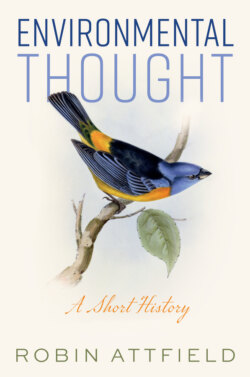Читать книгу Environmental Thought - Robin Attfield - Страница 14
Lucretius
ОглавлениеOne other Roman poet is too important to omit. Lucretius (c. 99–c. 55 BCE) was the first Roman poet to write philosophy in Latin, and was thus a predecessor of Virgil in composing didactic Latin verse. He was an adherent of Epicureanism, a philosophical stance which adopted (and adapted) the atomism of Democritus, and which advocated the pursuit of pleasure and avoidance of pain. Besides writing on physics, Lucretius also wrote on the development of life on Earth as well as on the rise of human culture. His account of the development of living creatures embodied an adjusted version of the relatively crude account of natural selection pioneered by Empedocles, a poet on whom he also modelled his verse.
Lucretius includes a passage (towards the end of his De Rerum Natura, Book II) about the Earth being past its prime and in a state of decline (rather as had Hesiod). But he also extols, in Book V, the development of human culture (agriculture and navigation included), and supplies one of few ancient examples of belief in progress. Coates (1998: 27) aligns this passage with the widespread ancient belief in a cosmic purpose to be found in all creatures, and even with belief in a purposive great chain of being, with each creature serving a higher stage in the chain, and with humanity as its apex. However, these were not remotely the views of the Epicureans, but rather those of their rival philosophical school, the Stoics. Lucretius, by contrast, rejected belief in cosmic purpose, holding that the gods were exemplars of tranquil indifference, which human beings should imitate. It is important to avoid stereotyping ancient attitudes, which were as varied as those of the modern world.
Yet Lucretius also had an eye for natural beauty, whether in landscape, streams or clouds, and presents many similes drawn from nature to illustrate his message about atoms and molecules. This part of his message (his atomism, that is) remained influential when, after his works were rediscovered during the Renaissance, many seventeenth-century scientists adopted his atomism, albeit adjusted to fit their belief in divine creation. Later still, the poet Thomas Gray (1716–71) composed a poem in Latin hexameters extolling the empirical philosophy of John Locke (1632–1704), imitating the verse and the similes of Lucretius, and echoing his love of landscape, estuaries and seas. Indeed, Lucretius’ influence lives on as much in pastoral poetry and its appreciation of nature as in modern science.
